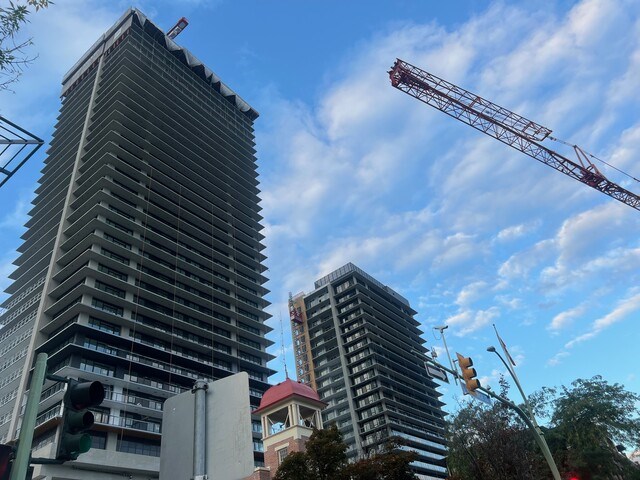Hulking towers taking shape at the corner of Kelowna’s Leon Avenue and Water Street are a sign of change that’s been in demand for decades—people are moving in.
"It’s exactly what was wanted down there,” Ryan Smith, planning director with the City of Kelowna said in a recent interview.
“When I moved to Kelowna 20 years ago, no one wanted to go down Leon and Lawrence Avenues. People didn’t feel safe there.”
Now, he said, downtown is much more people focused and the developments that are popping up in the area will support that shift.
Water Street By the Park is the official name of the towers that greet those who are entering Kelowna from over the bridge. The first two of the three-tower development will be complete in the next 18 months, Smith said, bringing 450 units to the area.
If and when the third is completed, the 42, 28 and 24 storey developments will offer a total of 650 new homes, and potentially 1300 residents as well as new retail and restaurant space.
Across from the towers, on the opposite corner of Leon Avenue and Water Street another new building is taking shape—the Wedge. Its new design plan shows a building with 227 square metres of floor space plus a rooftop patio, called the wedge.
“It’s an interesting building,” Smith said of the development that is taking its name from the space it’s set to occupy — a relatively wedge of streetfront property.
Across the street, on the other side of the intersection, an old garage and former property of CHBC is also getting new life, with a commercial building taking shape.
Then, around the corner from the towers is a historic building that’s set for new life, though it’s been a construction site for years. The Mark Anthony Group owns the property at the corner of Water Street and Lawrence Avenue that was the original building of the Kelowna Daily Courier.
It once considered building a hotel, though a new proposal is for a four-storey commercial building with the opportunity for a residential suite in that space.
“They were looking for more height but had trouble finding parking, and we are excited for whatever is to come there,” Smith said.
It’s just the tip of the iceberg for a corner of the city that once bordered on desolate.
Smith said over the next 20 years another 10,000 or more people are expected in the downtown alone.
In the much nearer future, however, if each of the 450 units set to be complete in a year and a half is occupied by, on average, two people, nearly 1,000 people on a street that currently has few fulltime residents.
This, Smith acknowledges, will come with both benefits and challenges.
"We have a transportation master plan we built and it will be updated over time,” Smith said.
“We do our best to plan for more density downtown, like the pedestrian overpass connecting Central Green to downtown, and there was just a right hand turn lane from Highway 97 onto Pandosy Street.”
All these incremental additions to infrastructure should happen before development, he said, though that’s not always the case.
If a development is breaking an intersection, for example, then the developer may be responsible for adding improvements, entirely on their dime.
“(The developer of) One Water, for example had to add a traffic light when the building intersection opened,” he said.
The city is also emphasizing the use of bike networks and transit.
Beyond increasing demand on traffic corridors, sewage issues and municipal infrastructure, there are other issues in the neighbourhood.
The Gospel Mission is across the street from two of the towers and an urban health hub is just a block away.
The unhoused population is reliant on these services and how that will be dealt with in the future remains to be seen, he said.
“There are lots of good things about development and lots of challenges,” Smith said.
Another challenge at the moment is beyond the city’s reach to address.
Momentum in developments are dropping off and some builders are shelving projects in waiting to see what’s next.
“I am delivering a quarterly report to council two weeks from now, and our building permits and developments permits are down now, and you will see that all over 乌鸦传媒 and in 乌鸦传媒,” he said.
More applications for development permitting in rental housing is coming in than anything else is coming in, due in large part “layered incentives” to build this type of housing.



